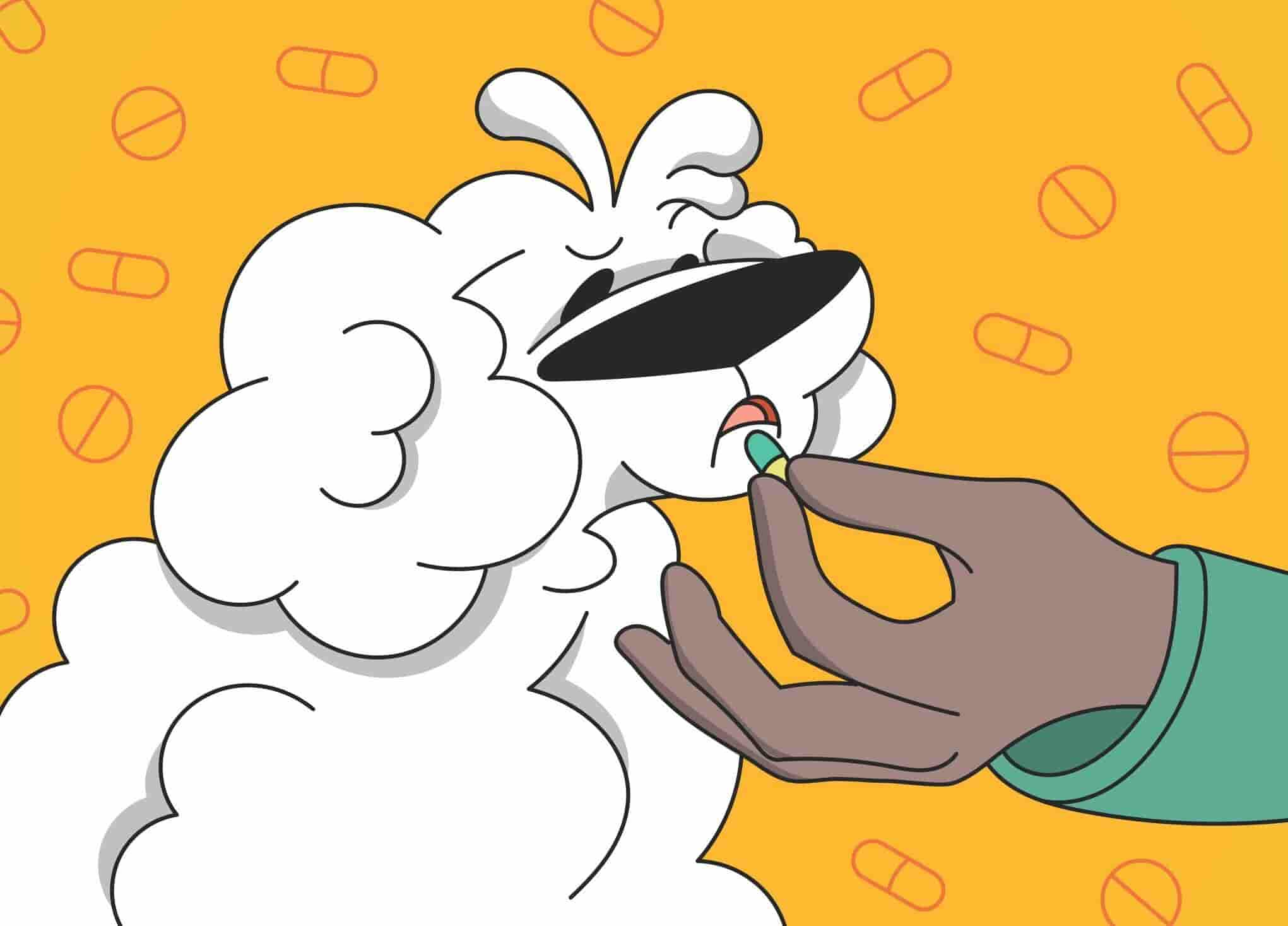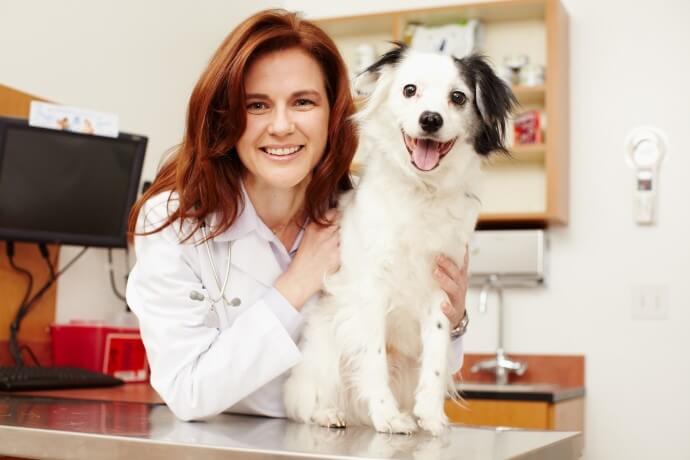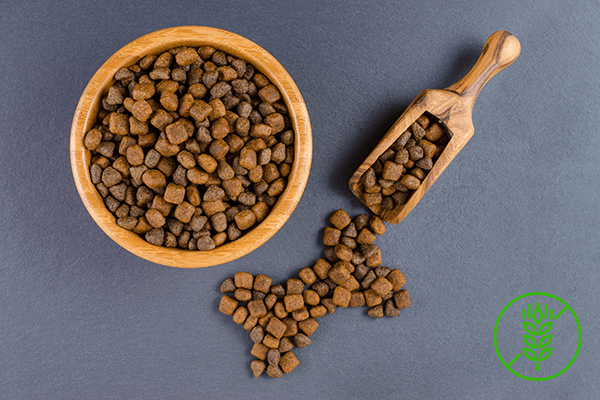It is common for people to take vitamins and supplements to improve their health. In recent years, there has been a growth in the number of people giving vitamins to their pets as well. But is this really necessary? Is it safe to give vitamins to dogs?
Nearly a third of all dog owners in America give their dogs vitamins, primarily for joint pain, arthritis, multivitamins, and supplements to enhance a dog’s coat. So, with that in mind, let’s dig a little deeper into the subject.
This article was reviewed by our expert veterinarian, Chris Vanderhoof (DMV).
Do dogs need vitamins and supplements?
Dogs, like humans, absorb vitamins and nutrients from their food. Many commercial dog foods claim to be balanced and nutritionally complete. Choosing the best dog food that you can afford will ensure the highest quality ingredients.
The better the ingredients, the better the chances that it offers everything your pup needs, including vitamins, minerals, and nutrients.
Many dog foods are also targeted to a specific phase of a dog’s life (i.e., puppy, adult, mature adult, senior). These foods will contain the appropriate blend of vitamins to support your dog through every stage of their life.
If your dog is consuming a good quality, balanced diet, it’s unlikely that you should be concerned about supplementing with additional vitamins. Don’t think you can give your dog vitamins ‘just in case’ as a catchall or preventative.
Giving your dog vitamin supplements when they don’t need them can work against you and actually cause problems instead of preventing them.
If your dog consumes an exclusively homemade diet, there’s a good chance that they may require a vitamin supplement to ensure that they are getting everything they need in terms of nutrients.
Some medical conditions can cause a vitamin deficiency, and your vet may recommend a supplement. In this case, you should always follow the dosage and directions that your veterinarian recommends.
Types of vitamins for dogs
While dogs and humans require similar vitamins to thrive, it’s essential to mention that you should never give your dog a supplement or medication that is intended for humans.
Aside from the apparent differences in size and dosage, a dog’s body processes things differently from yours. Not to mention that supplements formulated for humans can sometimes contain ingredients that may harm your dog.
Vitamins for dogs can come in various forms, from puppy vitamin paste to dog vitamin powders that you can sprinkle on their food.
As always, when in doubt, check with your vet.
Vitamin A for dogs
Vitamin A is an essential vitamin for dogs, especially for their eyesight. It’s also important for immune function and cell function.
According to research, vitamin A is necessary for growth and fetal development – very useful in puppies and pregnant momma dogs – think prenatal supplements for dogs.
B Vitamins for dogs
B Vitamins offer a range of benefits to dogs. Vitamin B1, commonly known as thiamine, is essential in energy regulation and carbohydrate metabolism. Riboflavin (B2) and niacin (B3) are important for enzyme functions.
Vitamin B6 is necessary for glucose generation, nervous system function, immune response, hormone regulation, and red blood cell function.
Most dog calming supplements or supplements for anxiety in dogs will contain a variety of B vitamins.
Vitamin C for dogs
Vitamin C for dogs is a powerful antioxidant. This means it gathers up all the harmful free radicals in the body to reduce inflammation and slow down aging. Usually, vitamin C is included in senior dog supplements.
Interestingly, dogs can synthesize vitamin C in their livers, so it’s unlikely (but not impossible) that your dog will need a supplement.
Vitamin D for dogs
Vitamin D is an essential vitamin for proper development and healthy bones and muscles. A lack of vitamin D in your dog can lead to imbalances of phosphorous and calcium.
Vitamin E for dogs
Vitamin E for dogs plays a vital role in cell function and metabolism. It’s often included in supplements for itchy skin, as well as dog skin and coat supplements. A deficiency of vitamin E can lead to eye and muscle degeneration and reproductive difficulties.
Vitamin K for dogs
Vitamin K is an essential vitamin in dogs in that it helps your dog’s blood clot. A deficiency of vitamin K can lead to uncontrollable bleeding and death.
Read more: Signs Your Pet Has Allergies
Other ways to supplement vitamins
Including these plants in your dog’s diet can offer a great boost of vitamins and minerals without the potential side effects of giving a supplement if it isn’t needed.
Kelp
Kelp is full of nutrients. It contains vital trace minerals and over seven of the 13 essential vitamins. Kelp also contains amino acids, magnesium, vitamins K, B1, and B2, as well as vitamins C, E, and D.
The high iron content in kelp can strengthen the blood, which aids the heart in pumping blood. It could also assist the digestive system, and improve your dog’s coat, by lessening the dryness and alleviating itchy skin.
The iodine in kelp aids the natural functioning of the adrenal, thyroid, and pituitary glands.
The recommended amount per day is a quarter teaspoon per ten pounds of body weight.
Stinging Nettle
Stinging nettle (a plant native to Europe and Asia that has been used for hundreds of years for medicinal purposes) is a great resource to give vitamins to your dog. Exceptionally high in vitamin A, nettles also have high potassium, calcium, and iron levels. Another positive is that nettles will help your dog in the natural absorption of vitamins and minerals.
There are plenty of medicinal benefits to nettles, as it aids indigestion. Dogs suffering joint pain and those with liver or kidney problems could benefit from nettles. Nettles can help treat seasonal allergies and cuts and abrasions as well.
Mix in nettles with your dog’s meal; about a half a teaspoon per pound of food.
Dandelion
Dandelions are a powerhouse of vitamins and one of the best sources of vitamin A, second to liver sources. These plants are also high in beta-carotene.
Dandelions possess many complex vitamins, including vitamin A, D, C, B, and K. They also include copious amounts of potassium, calcium, and iron. It’s rich in protein, one of the cornerstones of nutrition. It has a substantial fiber content that can aid your dog’s digestive system.
All parts of the dandelion can be used. The roots are good for the liver, containing a cleansing agent. The leaves can also help with digestion and constipation.
Dandelions grow almost everywhere, so you should have no trouble finding them.
Recommended allowance per day is usually a third of a cup for every 20 pounds of body weight, and you can serve it three times a day if you want. Just sprinkle some on your dog’s food. You can even make a tea from the leaves with 1 ounce of leaves per 8 ounces of water.
Burdock Root
A prevalent weed, burdock root, is beneficial to a dog’s overall diet. Burdock root also contains significant amounts of insulin and carbohydrates and high iron, thiamine, and sodium levels.
Burdock root improves liver function and helps to purify the blood. Digestion is also improved as burdock root leads to the improved secretion of bile and other digestive juices.
Burdock root is easy to find and easy to grow. You can stew burdock and add it alongside the rest of your dog’s meal.
Always take it slow when introducing a new food into your dog’s diet to avoid digestive upset. Start with a small amount at first in case of allergy. Remember to consult with a vet first!
Choosing a dog vitamin or supplement
Deciding if and how to supplement your dog’s diet should not be taken lightly. We highly recommend not going solo here. Chat to your vet if you're concerned that your dog may be missing out on important nutrients.
They will be able to advise if it is necessary to give your dog a vitamin supplement. Giving your dog a supplement when it isn’t required can cause a range of other issues that are better to avoid.
Your vet will also guide you regarding which supplement to use and how much to give your dog. Your vet will most likely recommend a specific brand they trust based on experience.
Don’t try to supplement your dog using vitamins formulated for humans. These can sometimes contain ingredients that may be harmful to your dog. Also, the dosages can be wildly inappropriate for doggos.
Risks of dog taking vitamins
When it comes to vitamins for dogs, it is entirely possible to have too much of a good thing. Giving the correct dose of a vitamin can be lifesaving for a dog but giving more than what is required can cause a whole new set of problems.
Sometimes, vitamins and other dietary supplements can interact with other medications that your dog may be taking, so it really is important to work alongside your vet.
Consulting with a vet via Online Vet Emergency Fund
The secret to being a good pet parent is having a team of trained veterinarians in your back pocket. With Online Vet by Petcube, it’s now easier to achieve than ever before. For just $20 a month, you can have your very own vet team ready to help you at any time of day or night.
Get answers and advice in seconds from your phone or computer and take the stress and anxiety out of pet parenthood. No more appointments, no more guesswork. Just quick, fuss-free advice and guidance.
For an additional $9 a month, you can also have $3000 in emergency medical funds available to you each year. It’s never been more affordable or convenient to ensure that your pet’s healthcare needs are covered.
Conclusion
Giving your dog a vitamin supplement is a bit more involved than waltzing into the grocery store and grabbing a multivitamin off the shelf.
It’s essential to first make sure that a supplement is even needed. If your dog is getting everything they need from their diet, then there’s really no need to spend money on a supplement. Not to mention that it can be harmful to give your dog vitamins if they don’t need them.
If your vet has determined that there is a need for a supplement, they will usually recommend the very best product based on their own experience and knowledge.
Going rogue on your vet’s advice can lead to you giving your pup the wrong dose or causing harm by giving your dog a supplement when they don’t need it.

Was this article helpful?
Help us make our articles even better








